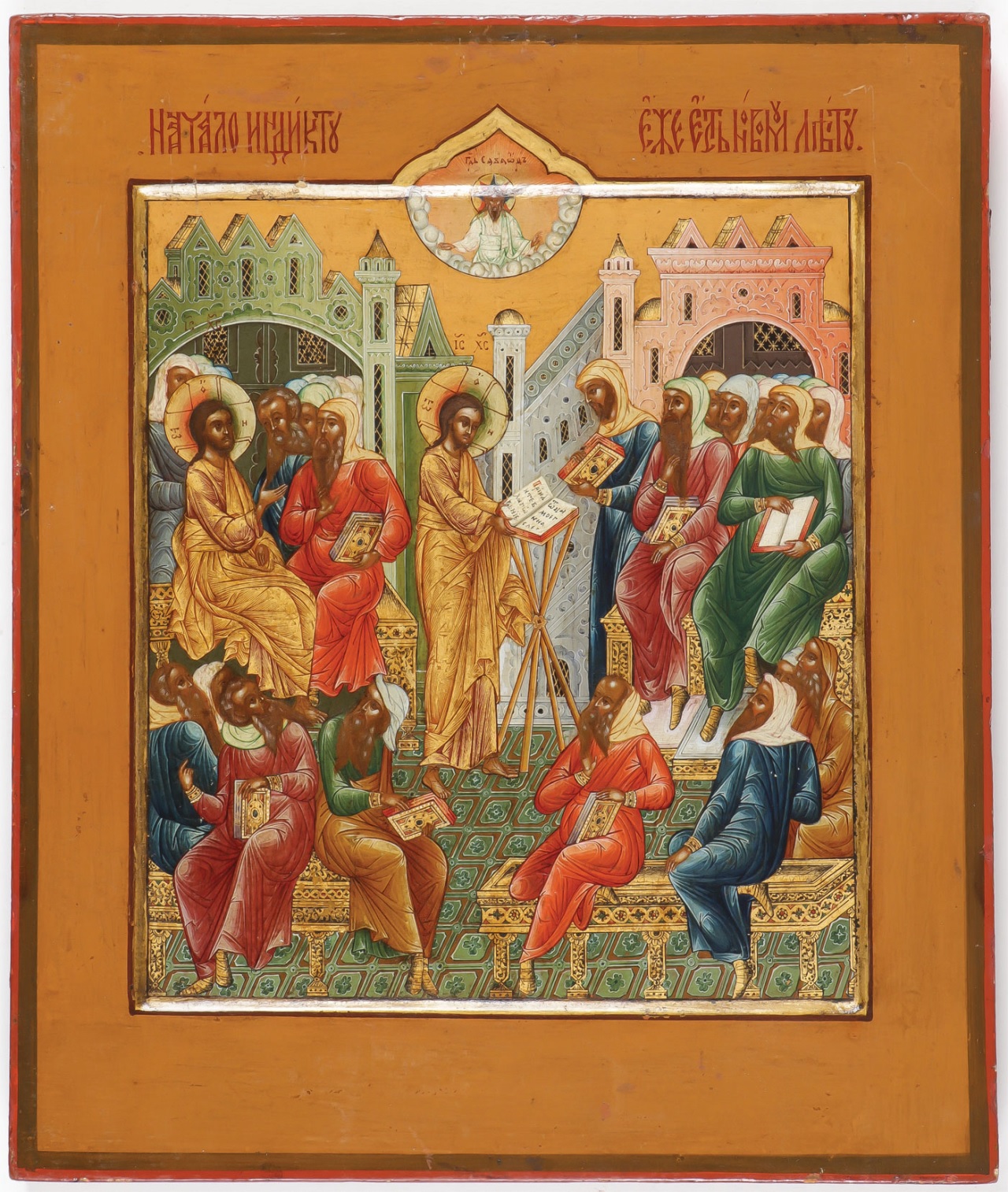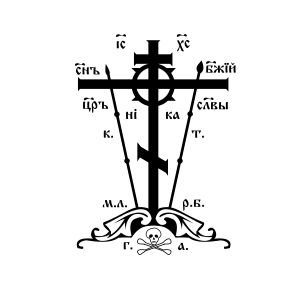
Ode 1, Irmos: O all ye people, let us chant a hymn of victory unto Him Who delivered Israel from the bitter bondage of Pharaoh and led them through the depths of the sea dry-shod, for He hath been glorified.
Glory to Thee, O God, glory to Thee.
Let us all chant a hymn of victory unto Christ, by Whom all things were fashioned and in Whom the incomprehensible is perfected, as the hypostatic Word begotten of God the Father, for He hath been glorified.
Glory to Thee, O God, glory to Thee.
Let us all chant a hymn of victory unto Christ, Who through the Father’s good pleasure appeared from the Virgin and proclaimed unto us the acceptable year of the Lord for deliverance, for He hath been glorified.
Glory be to the Father, and to the Son, and to the Holy Spirit.
The Bestower of the law, arriving in Nazareth, taught on the Sabbath day, laying down for the Jews the law of His ineffable coming, whereby He saveth our race, in that He is merciful.
Both now and ever, and unto the ages of ages. Amen.
O all ye faithful, chanting, let us ever praise the all-wondrous Maiden who shone forth Christ upon the world and hath filled all things with the joy of everlasting life, for she hath been glorified.
Ode 3, Irmos: Establish me, O Christ, upon the immovable rock of Thy commandments, and illumine me with the light of Thy countenance, for none is holier than Thou, Who lovest mankind.
Glory to Thee, O God, glory to Thee.
O Good One, establish Thou that which Thy right hand hath lovingly planted on the earth, preserving Thy Church, the fertile vineyard, O Almighty One.
Glory to Thee, O God, glory to Thee.
O Master, God of all things, lead through this year which beginneth those who adorn themselves with divinely beautiful spiritual works, and who hymn Thee with faith.
Glory be to the Father, and to the Son, and to the Holy Spirit.
O compassionate Christ, grant me a tranquil year and fill me with Thy divine words which Thou didst reveal when Thou didst speak to the Jews on the Sabbath.
Both now and ever, and unto the ages of ages. Amen.
We ever glorify thee, for thou alone didst, in manner surpassing nature, beyond human comprehension, receive grace in thy womb and didst, without changing, give birth unto Christ God.
Lord, have mercy. Lord, have mercy. Lord, have mercy.
Sedalion of the Indiction, in Tone 8: O Thou Who bestowest fruitful seasons and rains from heaven upon those on earth, and dost now accept the supplications of Thy servants: from all want do Thou deliver Thy city, for truly Thy compassions are evident in all Thy works. Wherefore, bless Thou our goings out and our comings in, set aright among us the work of our hands, and grant us forgiveness of offenses O God: For, as Thou art mighty, Thou didst bring all things from non-existence into being.
Glory be to the Father, and to the Son, and to the Holy Spirit; both now and ever, and unto the ages of ages. Amen.
(repeat sedalion)
Ode 4, Irmos: I have considered Thy dispensation, O Almighty One, and with fear have I glorified Thee, O Saviour.
Glory to Thee, O God, glory to Thee.
The beginning of the year do Thy people offer unto Thee, O Saviour, glorifying Thee with angelic hymns.
Glory to Thee, O God, glory to Thee.
As Thou lovest mankind, O Christ, count those who begin the year worthy to complete it in a manner well-pleasing unto Thee.
Glory be to the Father, and to the Son, and to the Holy Spirit.
O only and almighty Lord, having calmed the world, grant it cycles of years.
Both now and ever, and unto the ages of ages. Amen.
Let us all now hymn the Theotokos as the haven of our souls and our steadfast hope.
Ode 5, Irmos: Waking at dawn out of the night, we hymn Thee, O Christ, Who art consubstantial with the Father, and the Saviour of our souls: Grant peace to the world, O Thou Who lovest mankind!
Glory to Thee, O God, glory to Thee.
O Christ, Who fillest all things with goodness: do Thou grant unto Thy servants a year of varied seasons, crowned with mildness, fruitfulness and blessings.
Glory to Thee, O God, glory to Thee.
Yearly recompense, a turn for the better and a state of peace do Thou show unto us who know Thee to be Him Who became like unto men, O Word of God.
Glory be to the Father, and to the Son, and to the Holy Spirit.
Thou didst come to earth proclaiming from the Father the release of captives and the recovery of the blind, and the acceptable time, O Thou that art equally unoriginate with the Father.
Both now and ever, and unto the ages of ages. Amen.
We set our hopes and our desire on thee, O pure Theotokos. Him Whom thou didst bear do thou render merciful unto us, O Virgin.
Ode 6, Irmos: Thou didst save the prophet from the sea monster, O Lover of mankind; do Thou lead me up from the abyss of transgressions, I pray.
Glory to Thee, O God, glory to Thee.
O Master, with the beginning of the year vouchsafe us to begin a life well-pleasing unto Thee.
Glory to Thee, O God, glory to Thee.
O Master, with the beginning of the year vouchsafe us to begin a life well-pleasing unto Thee.
Glory be to the Father, and to the Son, and to the Holy Spirit.
O compassionate Saviour, show us forth who hymn Thee to be full of spiritual days in the study of Thy law.
Both now and ever, and unto the ages of ages. Amen.
O all-pure and most immaculate Theotokos who gavest birth to the Lord, from misfortunes deliver us who hymn thee.
Lord, have mercy. Lord, have mercy. Lord, have mercy.
Glory be to the Father, and to the Son, and to the Holy Spirit; both now and ever, and unto the ages of ages. Amen.
Kontakion of the Indiction, tone 2: O Christ our King Who livest in the highest, Creator and Maker of all things, visible and invisible, Who hast fashioned days and nights, seasons and years: bless Thou now the crown of the year; preserve and keep in peace Orthodox hierarchs, this city and Thy people, O greatly Merciful One.
Ode 7, Irmos: The children raised together in piety, disdaining the impious command, feared not the threat of the fire, but, standing in the midst of the flame, they chanted: O God of our fathers, blessed art Thou!
Glory to Thee, O God, glory to Thee.
O ye Orthodox people who now begin the year, let us set a beginning to our hymns to Christ Who reigneth over the everlasting Kingdom; and let us piously chant: O God of our fathers, blessed art Thou!
Glory to Thee, O God, glory to Thee.
O ye Orthodox people who now begin the year, let us set a beginning to our hymns to Christ Who reigneth over the everlasting Kingdom; and let us piously chant: O God of our fathers, blessed art Thou!
Glory be to the Father, and to the Son, and to the Holy Spirit.
O Christ, Who before wast, shalt be and art the Lord: fill Thou this year with Thy good gifts for those who hymn Thee, the Source of goodness, chanting: O God of our fathers, blessed art Thou!
Both now and ever, and unto the ages of ages. Amen.
As servants petitioning their Master, we set before Thee Thy pure Mother, O Christ, that Thou mayest deliver from every evil circumstance Thy servants who chant: O God of our fathers, blessed art Thou!
Ode 8, Irmos: Christ God, Who saved the chanting children in the furnace and transformed the raging flames into dew, hymn ye, supremely exalting Him for all ages!
Glory to Thee, O God, glory to Thee.
O Christ, the honoured Church offereth Thee the beginning of the year, as to the Author of our salvation, crying: Hymn ye and supremely exalt Christ forever!
Glory to Thee, O God, glory to Thee.
The Creator Who hath wisely renewed all that He brought into existence, and hath brought forth the cycles of the seasons by His will, hymn ye and supremely exalt forever!
Glory be to the Father, and to the Son, and to the Holy Spirit.
Let us chant unto God, Who hath brought forth all things and Who changeth the seasons for the manifold prosperity of men: Praise and exalt Christ supremely forever!
Both now and ever, and unto the ages of ages. Amen.
With the cycles and seasons of time, we, the assemblies of men, hymn thee in Orthodox manner as the Theotokos, the pure Virgin Mother of God, the salvation of all.
Ode 9, Irmos: The bush which burnt with fire yet was not consumed showed forth an image of thy pure birth giving. And now we pray that the furnace of temptation which rageth against us be extinguished, that we may unceasingly magnify thee, O Theotokos.
Glory to Thee, O God, glory to Thee.
O Word of God, Power, true and hypostatic Wisdom, Who sustaineth and directeth all things wisely, do Thou now peacefully order the season which hath dawned for Thy servants.
Glory to Thee, O God, glory to Thee.
All Thy works, O Lord: the heavens, the earth, light, and the sea, the waters and all the springs, the sun, the moon, darkness, the stars, fire, men and beasts, praise Thee with the angels. Thou alone art pre-eternal, in that Thou art the Creator of the ages.
Glory be to the Father, and to the Son, and to the Holy Spirit.
O reigning Godhead, One, indivisible, in three Persons: through the supplications of the pure Mother of God, show forth this year as fruitful for Thine inheritance.
Both now and ever, and unto the ages of ages. Amen.
O Saviour of all, Maker, Creator, and Ruler of all creation: through the supplications of her who gaveth birth to Thee without seed, grant peace to Thy world, preserving Thy Church ever undisturbed.

Troparion of the Indiction: O Fashioner of all creation, Who in Thine authority hast appointed the times and seasons: bless Thou the crown of the year with Thy goodness, O Lord, preserving in peace Orthodox Christians and Thy city, and save us through the prayers of the Theotokos.